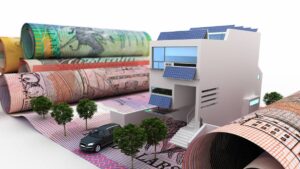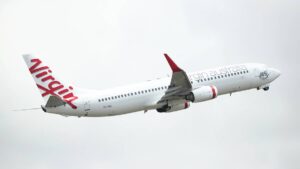Half of Australia wants to buy a new car, so which ASX auto stocks could benefit?

Survey shows there is a soaring interesting in buying new cars in Australia. Picture Getty
- A survey shows a soaring interest in Aussie buying a new car
- But supply chain issues have created a long waiting list
- We look at automotive stocks on the ASX
Research commissioned by Money.com.au indicates there is a soaring interest in new car purchases in Australia.
The survey reveals that half (51%) of Australian adults would purchase a car before 2024 if supply chain problems did not impact stock levels.
The global automotive industry has suffered severe supply chain disruptions, specifically an acute shortage in semiconductor chips that’s causing a global shortage of 2.2 million cars.
In Australia, new car sales have been more than 10% below historical monthly averages over the last two years.
Toyota, for example, reported a 6.1% decrease in global sales, and a 3.5% decrease in worldwide production from January to June.
The problem is beginning to ease slightly, but the worldwide shortages in semiconductors, which play an essential role in the safety features of cars, are predicted to continue well into 2023 and beyond.
Growing trends
Money.com.au found that a higher proportion of younger age groups were in the market for a new car before 2024 – 59% were from the 18-34-year age bracket.
This compares with just 38% from the over-50s bracket.
The survey also revealed that two-thirds of Australians (68%) would rather buy a secondhand car than sit on a waitlist for a lengthy period for a new car.
Specifically, 29% said they would buy a used car if the waitlist for a new car was more than three months. Only 12% said they would buy a new car if the waitlist was more than a year.
As a result, secondhand vehicles in Australia are now 14.2% higher than last year.
Helen Baker, a spokesperson for Money.com.au, says that the survey results echo the sentiment among Australians she speaks to on the ground.
“Many of my own clients are willing to wait for a new car, with a significant proportion turning over their cars as frequently as every two to three years, even if they are not in need of an upgrade,” said Baker.
“While the choice to purchase a new vehicle is dependent on one’s financial situation, savings and overall car usage, it is important to remember that it is a depreciating asset.
“Younger Australians are likely more willing to purchase a used car for this reason, as they may not have the funds built up for a large purchase or are prioritising other purchases or investments, such as their first property.”
Baker said that during the pandemic, many Aussies have also likely hit pause on large essential and non-essential purchases.
“Now that we’re returning to a sense of normalcy, despite rising costs, people are considering those purchases again,” she said.
Baker also said she’s seeing a growing trend of individuals, particularly those approaching retirement, seeking large, functional vehicles over luxury ones, including campervans, as their next significant purchase.
“Many are committing to such vehicles due to a desire to travel around the country, now that borders are open and allow for more free movement.”
Automotive stocks on the ASX
| Code | Company | Price | % Year | % Six Month | % Month | Market Cap |
|---|---|---|---|---|---|---|
| PWH | Pwr Holdings Limited | 9.61 | 21% | 9% | 19% | $963,845,002.06 |
| SUL | Super Ret Rep Ltd | 10.42 | -14% | -8% | 4% | $2,353,112,130.00 |
| ATL | Apollo Tourism | 0.565 | 82% | -4% | 9% | $105,175,263.02 |
| PWR | Peter Warren | 2.6 | -23% | -4% | 5% | $446,993,523.60 |
| MTO | Motorcycle Hldg | 2.48 | -15% | -16% | 5% | $153,032,640.80 |
| ASG | Autosports Grp Ltd. | 2.06 | -11% | 6% | 13% | $408,030,000.00 |
| SFC | Schaffer Corp. Ltd. | 17.59 | -18% | -12% | -2% | $239,593,864.93 |
| APE | Eagers Automotive | 13.12 | -20% | -6% | 7% | $3,376,101,012.84 |
| CAR | Carsales.Com Ltd. | 21.83 | -12% | 9% | 10% | $7,553,739,677.75 |
| ABV | Adv Braking Tech Ltd | 0.032 | -16% | -9% | -9% | $12,132,760.51 |
| BAP | Bapcor Limited | 6.5 | -13% | -4% | -3% | $2,195,998,875.00 |
| ARB | ARB Corporation. | 32.1 | -40% | -24% | -2% | $2,629,207,942.68 |
| VMT | Vmoto Limited | 0.395 | 18% | 4% | 10% | $111,656,309.40 |
| GUD | G.U.D. Holdings | 8.42 | -18% | -30% | -2% | $1,186,333,340.32 |
| NTD | National Tyre&Wheel | 0.865 | -27% | -36% | -18% | $114,124,641.73 |
| FDV | Frontier Digital Ltd | 0.86 | -44% | -33% | -6% | $326,211,631.86 |
| SIX | Sprintex Ltd | 0.039 | -44% | -46% | -45% | $9,919,818.75 |
Carsales.com (ASX:CAR)
Carsales.com.au has been around since 1997, and was one of the first auto marketplaces out there.
It has a simple revenue model where it charges a fee for a seller to list their vehicle until sold. It also charges for advertising space on the website.
The platform now commands a market leadership position in Australia.
CAR saw strong financial performance across its Australian and international portfolio in FY22.
Trader Interactive, which serves the recreational vehicles, motorcycles and boats market, delivered strong financial performance as customer numbers and inventory levels improved significantly.
For the year, CAR reported revenues of $509m, up 19% on pcp, while NPAT was $161m, up 23% on pcp.
Looking ahead, CAR says it expects to deliver very strong growth in revenue, EBITDA and NPAT in FY23 without providing any figures.
Peter Warren (ASX:PWR)
Peter Warren is a dealership network that has been operating in Australia for over 60 years. The company now operates 82 franchise sites, and represents 28 original equipment manufacturers (OEMs).
The dealership network has not released its full year results, but its half-year earnings delivered an underlying revenue of $777.9m, up 4% on pcp.
The revenue is tracking around 5% above prospectus forecast.
In December, Peter Warren acquired 100% of the Penfold Motor Group for $106m. The acquisition is expected to expand PWR’s footprints across the eastern seaboard of Australia.
Apart from the dealership business, PWR also supplies advanced cooling solutions to all the Formula 1 and Formula E racing teams.
Sprintex (ASX:SIX)
Sprintex focuses on superchargers and clean air compressor engineering.
Its main product is the Sprintex twin screw superchargers for the aftermarket and OEM markets in Australia, Asia, Africa, the Middle East and the United States of America.
The company has manufacturing capabilities in China, after announcing the establishment of Sprintex Energy Technology in the city of Suzhou in Jiangsu Province.
The refurbished 1,500sqm facility will become the company’s new engineering centre and production base for Sprintex in China.
Sprintex China has obtained a series of subsidies from the Chinese Government for its high-tech operations and clean energy profile.
RPM Automotive (ASX:RPM)
RPM focuses on the aftermarket segment, which has boomed when manufacturers like GM, Ford and Toyota left Australia’s shores.
According to the latest data from the Australian Automotive Aftermarket Association (AAAA), there are now 300 aftermarket manufacturing companies operating in Australia, which has increased from 260 in 2015.
The combined export revenue within the sector currently sits at $640m, with the US remaining the key export market ahead of Europe, NZ and the Middle East.
RPM CEO Clive Finkelstein argued that higher interest rates will slow down new car sales, but other segments like the aftermarket will actually grow exactly because of it.
“If you can’t afford to buy a new car, you need to maintain and fix your old car,” he told Stockhead previously.
“We definitely find from an accessorising point of view that people accessorise used cars or older vehicles more than they do new ones.”
In the last quarter, RPM delivered $26.5m in revenue, a 74% growth from the pcp.
Autosports Group (ASX:ASG)
Autosports Group focuses on the luxury market, mainly the European brands. It has over 40 luxury and prestige car dealerships located in NSW, Qld and Vic.
The company started in 2006 with the establishment of the Audi Autosports Dealership as a greenfield site.
For the full year of FY22, Autosports delivered a record net profit after tax of $54.6 million, up 29% on the pcp.
The company says it’s seeing new vehicle orders increase by 66% since December 2021.
Vmoto (ASX:VMT)
Vmoto focuses on the development, manufacture and distribution of electric two-wheel vehicles (electric motorcycles and electric mopeds) in international B2B and B2C markets.
The company owns a 30,000sqm state of the art manufacturing facility in Nanjing, China.
Vmoto has a long history of successful manufacturing of two-wheeled vehicles since 2009, and possesses a first mover advantage in electric vehicles.
Its three brands are Vmoto, its proprietary brand, Super Soco, and CUX Ducati – both third party brands that Vmoto holds exclusive sales and marketing rights for.
Related Topics
UNLOCK INSIGHTS
Discover the untold stories of emerging ASX stocks.
Daily news and expert analysis, it's free to subscribe.
By proceeding, you confirm you understand that we handle personal information in accordance with our Privacy Policy.








